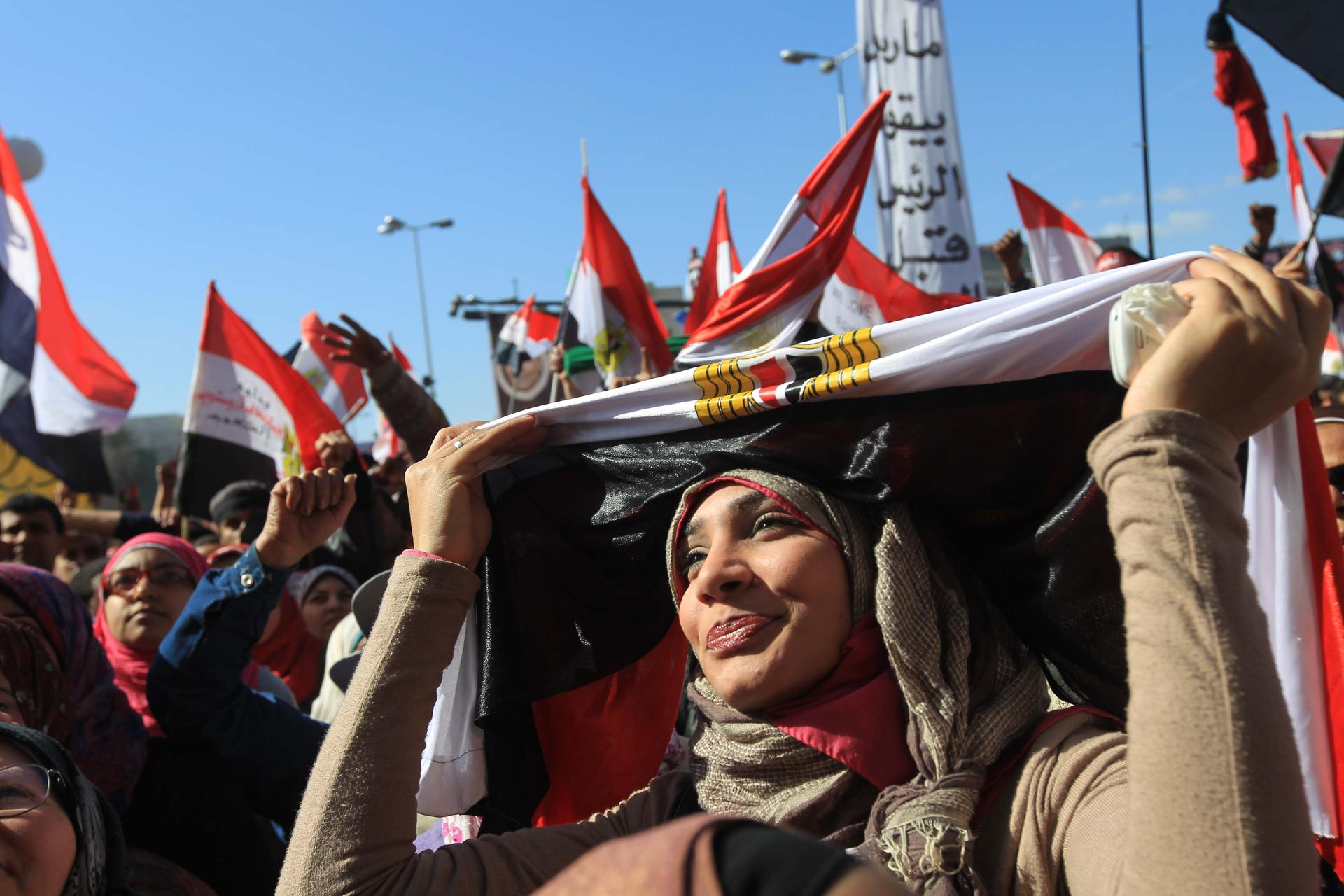The hidden feminine side of Egypt’s revolution
An Egyptian women covers her head in a national flag as she demonstrates in Cairo’s Tahrir Square on January 27, 2012, ahead of a mass rally to demand democratic change, a year after the country’s revolt that overthrew the regime.
NEW YORK — If not for a group of Egyptian women leading the way to Tahrir Square last Jan. 25, said Muslim Brotherhood media researcher Sondos Asem, the revolution might never have begun.
"We helped the men to march to Tahrir Sqaure," Asem told an audience at the Women in the World Summit in New York City on Friday. "It was extremely difficult for them to bypass the security barriers so we stood up at the forefront in order for the men to come behind us. When the security forces saw that number of women at the front, they were actually scared. They could not attack us."
Daily Beast blogger Andrew Sullivan moderated a panel of four Egyptian women, two of whom had difficulty simply getting the visas to attend the conference, discussing the role of women in Egypt. The conversation balanced between a new sense of possibility for women and the public violence, brutality and continued marginalization that have come in different ways from the military regime, conservative political parties and Egyptian men in society.
"Those 18 days of revolution, I believe they were heaven for Egypt," said Dalia Ziada, Egypt director of the American Islamic Congress. "But before those days, women helped pave the way for the revolution. We have been there in economic life, we have been there in politics, we have been there in civil society and in media, fighting for this day."
More from GlobalPost: 'The Army, The People': Egypt's Continuing Revolution
For example, Asem had been organizing community outreach and public relations for the Muslim Brotherhood for years prior to 2011, but she did so under a pseudonym.
"Otherwise I would have experienced intimidation and so would my family," Asem, who also ran her family's publishing house before the revolution, explained.
Dr. Omaima Kamel has been working in public health for 20 years and is a professor at Cairo University. She said that last Jan. 25, she and fellow faculty members from the university marched the several miles into Tahrir, inviting bystanders to join.
She is also a member of the Muslim Brotherhood’s Freedom and Justice Party and ran unsuccessfully for parliament. Her husband ran as well.
"We campaigned together," she said. "He won but I didn't. But I don't care."
The panelists acknowledged the great disparity that Egyptian women still see, but prefer the greater honesty of the post-Mubarak era. For example, under Mubarak a percentage of parliamentary seats were allotted to women but the country's first free elections in decades yielded just a handful of seats to women.
Ziada also ran for parliament and lost. She criticized the way not only the way the very conservative Salafist party handled the election but also a number of the so-called "liberal" parties. Ziada said female candidates' names were often relegated to the bottom of the ballot without the photos that accompanied men's names.
"When you went to ask them, 'Why did you do this?'" Ziada explained. "They just said, 'The patriarchal society will not accept it.'"
Sullivan asked the panelists — three covered in headscarves — about whether they blamed Islamists for the rash of public violence against women in the tumult of Egypt's transition, epitomized by the "girl in the blue bra" beaten and partially stripped by the the Egyptian military. Asem quickly assigned the blame to the military itself.
More from GlobalPost: Samira vs. the military
"We believe this will never stop unless the military hands power to a civilian president," she said, mentioning a June deadline the military set for the handover. "I believe on that day our revolution will start to bear its fruits."
Namees Arnous, executive director of the progressive social change organization Bokra for Media Production, Media Studies and Human Rights, spoke in favor of a secular Egyptian society.
"I refuse totally the relationship between religion and the political life," she said. "But in Egypt it's not like that. I refuse any limit on my freedom."
About the Salafis, she said, "They just want to put women in a box inside a box inside a home."
Arnous resigned her position at a news outlet called Elmehwar TV after it broadcast claims that anti-Mubarak protesters were motivated by outside forces including the Israeli Mossad. Her organization trains young journalists in media skills and promotes political and social change in Egypt.
She, like the other three women on stage, is carrying revolutionary momentum forward into a new Egypt.
"There is no spring without flowers," Ziada said. "Likewise there is no Arab Spring without women."
We want to hear your feedback so we can keep improving our website, theworld.org. Please fill out this quick survey and let us know your thoughts (your answers will be anonymous). Thanks for your time!
